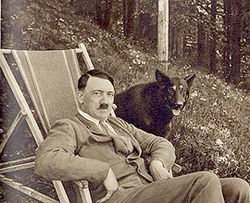User:Sycamore/Propaganda
“I was often truly amazed to see what great actors the Jews were, the way they immersed themselves in their roles was astonishing”
– Leni Riefenstahl on political filmmaking

Propaganda is a method of getting your point across and a kind of advertising for poor countries who can't go to corporations to do it for them. Today many countries rely heavily on propaganda, and governments worldwide all use it in some form as well as the corporations that live and work under them and sometimes over them.
It is used widely today however most propaganda is hired from companies. Such companies prefer to call their trade be called Spin, Public relations or Lie Quest 2000.[1] Most political parties use propaganda however the publicity and behavior molding is never described as 'propaganda' or being negative force unless it is whoever is the losing party in a propaganda war.
Uses[edit | edit source]
The uses of propaganda are numerous and often it is used in unlikely ways. For example it has been used in supporting free countries to promote corporate agendas such as selling hats or fatty foods to inbred children. It is also used by governments to control populations. This kind of propaganda is usually called spin however even the opposition take part and as such propaganda within the mass media is one of the most powerful forces known to man that was created by him.
It also is used to win elections, whether by the ballot box or by the gun to ensure public unrest does not result. The use of propaganda or derivative names is often blamed for a loss of public faith in political structures; however most people can't handle the truth and actually prefer to be 'misled' by leaders. So much so that people will side with a side they know to be wrong solely on the basis that an inferior party said something that plays more into their preference.
Parents also use it on their children to ensure they develop in a desired way. It is often the case that fear is used often in the form of imaginary enemies which present an ever-present and real danger which the offspring must be protected from. However like all methods of control it has highlights and low-lights and many feel propaganda is portrayed too positively. Those responsible for the portrayal of propaganda claim that they would rather be seen to do a good job so as to get their annual bonuses.
Techniques[edit | edit source]

Most propaganda comes from the media, unless some heavy’s kicked the crap out of non conformer at their front door. Such aggressive messages are usually directed at Jews or towelheads or some other undesirable groups like the Irish. Often propaganda is tied in with social commentary in an effort to reach out to communities and the general populace in order to "get them on message".
There are three commonly used types of propaganda and although technology has diversified, the techniques used remain largely the same. The convergence of technology in the digital age often means that the techniques used often converge themselves and can be difficult to distinguish.
- Conventional media: This tends to take the form of campaigns fought using public arenas such as billboards and the use of television and films. The theory works based on Mary Whitehouse’s idea she came up with about people being influenced by directly what they see. Often images which present a certain point of view however distorted become fact over time. Similarly people reinforce realities they don't understand with fiction and such media is one of the best ways of controlling people. It has been the case that over the past 20 years we have progressively seen society steer more towards being like a 'bus stop novel' such as the Da Vinci code in the public's imagination.
- Censorship: This is often done by Spin doctors or propaganda departments. Often the more subtle the better, for instance The Daily Show pool primetime audiences away from more serious channels like Sky news or Fox. This is a more covert system for the financially endowed, however, for the poorer propaganda practitioner out and how state banning works well in a docile populace. Rupert Murdoch is famed for explicitly blocking coverage of certain stories that might be outside of News Corps.' interests, this has spilled over into political concerns and allegiances.
- Word of mouth: Possibly the most covert and usually practiced by governments to counter media bodies seeking to give a portrayal that is not in keeping with the government line. This is often the work of a spin doctor who will give flak to disobedient reporters to ensure the media traffic remains positive. This has been practiced a great deal by recent governments whose political parties have invested heavily in propaganda to not only win elections but also pass policies which biased press and counter party propaganda departments might oppose.
Types[edit | edit source]

Traditional media formats are great as the message is often synonymous with the intended content these days. Often programs such as the news portray ideologies and views regardless of impartial mandates. Often propaganda wars involving small children are used to justify views and attitudes. News outlets remain common places to find propaganda.
Today times have changed dramatically from early propaganda, where obvious messages were tied into a message for a target market. However with a digital age maintain this fragile system is becoming evermore challenged as populaces question the logic of the fabrications. As time progresses a more intense variant of propaganda has started to emerge that defines itself more economically and makes use of the digital divide to enforce its view and subdue counter opposition. It remains to be seen whether propaganda will work as well in the future.
State Propaganda[edit | edit source]
The state pumping a point of view into the public minds collective consciousness is the oldest type of propaganda. This takes many forms, often public spectacle or subtle methods of manipulating the media. This is often falls in the realms of commercial media forms and telling the difference in the world today is increasingly difficult. This older form used to project a message of patriotism however this has shrunk in favour of a more economically aspirational audience.[2]
Most conventional media propaganda tends towards being politically charged at some level. Often sexuality is used, with strong male figures for the aspirations of males and the desires of females. However there is always a need to create subservient social structures for it to work, as any system based on behaviorism requires common consensus which is both produced and maintained by propaganda.
Corporate Propaganda (advertising + PR)[edit | edit source]
Advertising remains one of the most commonly practiced type of propaganda by far. It is also the more socially acceptable form of manipulation. However there are a number of controversial issues in advertising, for example the NSPCC are reducing sperm counts worldwide with their aggressive ad campaigns. This is compounded by the negative impacts of fat people watching too much television and racking up massive overdrafts from call in channels such as QVC and Quiz Call which are the root cause of the 'credit crunch'.
Adverting is by far the most prevalent from of propaganda today, with huge amounts of money spent yearly on suppressing up and coming brands and ensuring corporate supremacy. Ironically opposite to this system are in fact the biggest investor per the quotient of money they receive, charities such as Amnesty International spend more on advertising, and use spin aggressively to counter mainstream consensus constructed by journalists and PR firms.
